In Focus This Week
Innovation for Public Records
Centralizing Requests in Washington State
By April Tan (Policy Lead, Center for Election Innovation & Research);
Carly Colen (Research Assistant, Center for Election Innovation & Research); and
Stuart Holmes (Washington Office of the Secretary of State)
Election offices across the country experienced an influx of public records requests following the 2020 election, draining local officials’ resources and creating a potential opening for the spread of false information.
To ease the burden on local offices and make the public records process more efficient, the Washington state legislature passed SB 5459 in 2023 to centralize the response process for election-related records requests.
“The secretary’s office is now responsible for responding to all requests for standardized voter data,” Stuart Holmes, director of elections for the state of Washington, told researchers at the Center for Election Innovation & Research (CEIR). “The data is stored in the voter registration database that the secretary’s office maintains and supports. We know the database best; we know exactly how to get the data and how to get it the most effective way.”
CEIR spoke with the Washington Elections Division in April 2025 to better understand the implementation and impact of SB 5459, and its research team recently released a case study highlighting Washington’s experience implementing the law.
“The intention is to provide the requestor with the exact information they’re asking for in a timely manner,” Holmes said. “The new law creates an efficiency for counties and eliminates some misinformation and misunderstanding about the data people are receiving.”
The 2023 law requires all requests for standard reports, or for records from the statewide voter registration database, to be submitted to and fulfilled by the Office of the Secretary of State. Under the law, counties are not required to respond to such requests if they receive them and must tell the requestor within five business days to submit the request to the Office of the Secretary of State.
Since its implementation, the law has had several benefits for requestors and officials. Holmes told the CEIR team requestors “are getting the same if not better level of service by going to the state, and centralization saves staff time for county offices so they can focus on other election tasks.” Holmes noted an additional benefit was reducing the risk of inadvertently disclosing non-public information.
Washington built on existing systems and processes to implement the centralization law. Through its integrated voter registration database and election management system, the state and counties have access to the same data, which makes it possible to centralize and streamline processing public records requests.
Holmes also praised the staff in the secretary’s office, saying they were well-equipped to implement the law. “We were able to invest in the current team and automate procedures, set up a query library, without having to go out and hire other people. Understanding what you have on staff and utilizing those talents and tech really creates innovation,” Holmes told CEIR.
Based on Washington’s experience, CEIR identified three key considerations for election officials and legislators considering centralizing public records requests in other states:
- Study the nature of requests for more effective implementation. By cataloguing the type and volume of requests Washington’s Office of the Secretary of State received, staff were able to automate responses to many types of records requests.
- Assess internal capabilities to evaluate what is needed to implement centralization. Washington was able to implement a centralized process efficiently by building on the integrated voter registration database and election management system maintained by the state and utilizing in-house technical expertise.
- Draft clear and intentional statute language. Washington’s law was enacted to make the records response process more efficient by requiring the secretary’s office to handle certain public records requests. For example, the secretary’s office can fulfill requests for records related to system logs and activity more effectively than county offices. However, there are some requests counties can fulfill using reports from VoteWA that are specifically designed to provide public information. Clearly permitting these requests to be fulfilled by county offices would minimize confusion.
For more information about centralizing public records requests and what Washington did, read the full case study here.
For more information about election-related public records requests, read our report: “Election Officials & the Misuse of Public Records Requests”.
JEARP
Newest Issue of the Journal of Election Administration, Research and Practice Now Available
The latest issue of the Journal of Election Administration, Research and Practice is now accessible for free to the public on the Election Center website.
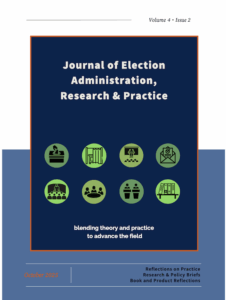 Volume 4, issue 2 of JEARP arguably contains the most diverse variety of authors and subject matter seen in a single edition of the journal so far.
Volume 4, issue 2 of JEARP arguably contains the most diverse variety of authors and subject matter seen in a single edition of the journal so far.
JEARP editor in chief Mitchell Brown said, “This issue includes perspectives from some of the most impactful voices in the field, and we’re very proud to have the opportunity to share their wisdom and insights.”
Volume 4, issue 2 boasts a robust “Policy and Practice” section with writers and topics from several unique places in the elections space. These include:
- an interview on the state of U.S. elections with current Election Assistance Commission Chair Donald Palmer,
- a study of the growth and various types of state associations of election officials from Tifawni Haynes and Grace Gordon of The Turnout,
- the case for using ballot-marking devices (BMDs) to mitigate the issue of residual votes from Sara A. Cutter of the American Council of Election Technology, and
- an applied case study by Drake Rambke on using best practices to reduce voter error associated with ranked-choice voting.
In this issue’s “Practitioner Reflection” section, JEARP’s continuing efforts to highlight best practices and election offices rising to meet the moment during disaster situations is again demonstrated by Dean C. Logan’s recollection of Los Angeles County’s response to the January wildfires.
Logan’s article is joined by Peter Lichtenheld’s story of his unique path to his recently completed career as an election vendor along with his best advice about how to get the most out of working with election vendors.
Last but far from least, this issue is wrapped up with three important research-based articles accompanied by practitioner responses to each. The first, from University of Florida authors Elena Puzikova and Michael P. McDonald, studies the often-overlooked issue of address verification for the homeless who attempt to register to vote.
The second article by the team of Christina S. Barsky, Amanda D. Clark, and Monica Bustinza extends the journal’s ongoing conversation on violence and threats of violence against election workers by analyzing state legislatures’ responses to the problem, particularly through threats disproportionally faced by women in the election workforce.
Finally, research from Christopher A. Cooper and Michael Bitzer tackles the trend of voter registrants providing less and less optional demographic data when attempting to register and what effects this could have on the future of being able to understand the composition of the electorate.
Anyone can now access this issue along with all previous issues of JEARP without having to create an Election Center account by following this link: https://electioncenter.org/journal-of-election-administration-research-practice/.
JEARP is developed and produced through a partnership between the National Association of Election Officials (the Election Center) and the Auburn University Institute for Election Administration Research and Practice.
It is designed to address the concerns of the practice, policy, research, vendor, and advocacy communities involved in the administration of elections in the United States and abroad.
If you would like to submit an article to JEARP or have questions about the submission process, please contact JEARP managing editor Brandon Fincher at finchrb@auburn.edu.
electionline Daily News Email
 What’s the best part of waking up? electionline Daily News in your inbox of course so be sure to sign up for your daily dose.
What’s the best part of waking up? electionline Daily News in your inbox of course so be sure to sign up for your daily dose.
Each morning you’ll receive the top headlines of the day, plus a listing of states featured in that day’s news round up.
To sign up, simply visit our site and provide us with your email and you’ll begin receiving the news in your inbox each morning.
We Google so you don’t have to!
Election News This Week
 Federal Update: This week, President Donald Trump issued federal pardons for Rudy Giuliani and dozens of others involved in efforts to overturn the results of the 2020 presidential election, including the so-called fake electors who participated in a scheme to cast electoral votes for Trump in states that he lost. The pardons were announced by Justice Department Pardon Attorney Ed Martin on X, in a post that referred to the fake electors as “alternate electors.” Along with Giuliani, those pardoned included John Eastman and Sidney Powell, who were also members of Trump’s legal team, and Mark Meadows, who was Trump’s chief of staff. “This proclamation ends a grave national injustice perpetrated upon the American people following the 2020 Presidential Election and continues the process of national reconciliation,” the announcement said. The pardons are largely symbolic, since the people receiving them aren’t facing federal charges. Several of them face state charges, for which the president has no pardon power. Still, according to Votebeat, it represents another step by Trump to wipe away consequences for allies who participated in efforts to overrule the will of voters and overturn his 2020 election loss.
Federal Update: This week, President Donald Trump issued federal pardons for Rudy Giuliani and dozens of others involved in efforts to overturn the results of the 2020 presidential election, including the so-called fake electors who participated in a scheme to cast electoral votes for Trump in states that he lost. The pardons were announced by Justice Department Pardon Attorney Ed Martin on X, in a post that referred to the fake electors as “alternate electors.” Along with Giuliani, those pardoned included John Eastman and Sidney Powell, who were also members of Trump’s legal team, and Mark Meadows, who was Trump’s chief of staff. “This proclamation ends a grave national injustice perpetrated upon the American people following the 2020 Presidential Election and continues the process of national reconciliation,” the announcement said. The pardons are largely symbolic, since the people receiving them aren’t facing federal charges. Several of them face state charges, for which the president has no pardon power. Still, according to Votebeat, it represents another step by Trump to wipe away consequences for allies who participated in efforts to overrule the will of voters and overturn his 2020 election loss.
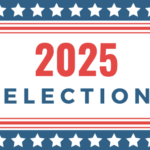 2025 Election Update: Even with ballots still being counted (and recounted) and ties being broken and races certified, the 2025 election season is just about over. We did a pretty complete round-up last week, but wanted to follow-up on a few more items of note this week. According to Votebeat, Pennsylvania’s Chester County has reviewed more than two-thirds of the provisional ballots cast on Election Day, and confirmed that it has begun counting eligible ballots, though officials still cannot explain what caused a pollbook error that forced independent and third-party voters to use provisional ballots. County officials said they hope to have the answer by December, after an investigation by an outside firm. In Hamtramck, Michigan, results remain in limbo a week after the election and the city’s clerk has been put on administrative leave because of dozens of ballots that weren’t counted. Thirty-seven absentee ballots were not properly tabulated on election night due to what Hamtramck Deputy City Clerk Abe Siblani called “human error at the counting board.” He said the issue would be resolved during the county canvassing meeting November 13. According to Votebeat, it is unclear why the ballots weren’t counted. In Dorchester, Massachusetts Municipal Court Judge Rebecca Figueroa ordered Richard Futrell, 46, to stay away from a poll worker who initially informed him that he couldn’t indulge in a buffet prepared for voting officials at Metropolitan Baptist Church. Boston Police officers monitoring the polls at the church arrested Futrell around 12:45 p.m. Tuesday after subduing the Election Day chaos. The poll worker told responding officers that Futrell “stepped in her face and continued to verbally berate her” after she told him that he couldn’t help himself to a plate of food. She said she felt “intimidated” and feared that the suspect “might ‘do something,’” according to an incident report, obtained by the Herald. Voters who did not follow a new Montana law requiring electors write their birth year on the envelope of an absentee ballot had the chance to fix the issue if they responded to a call, mailed notice or email from their local election department, but thousands of ballots still ended up in the rejected pile when all the counting was finalized. According to the Secretary of State’s office, “only one percent” of ballots were rejected due to a missing or mismatched birth year. However, some counties had rejection rates significantly higher than one percent, and almost all large counties saw higher rates than previous elections. Over 2,000 Maricopa County, Arizona ballots that were misplaced by poll workers were discovered November 7, forcing election officials to rush to make sure they are counted. In a statement, a spokesperson for the Maricopa County Elections Department said the ballots were placed in sealed boxes and mistakenly put in a blue drop box instead of being returned to the county’s election center. “Immediately after the discovery, a bipartisan team of election staff took custody of the sealed bins and worked quickly to ensure chain of custody was followed. The green affidavit envelopes will now be signature verified and processed for tabulation,” Deputy Elections Director Jennifer Liewer said. A video circulating on social media of Pima County, Arizona election workers emptying an overfilled ballot drop box prompted threats against them that county officials have reported to law enforcement, county officials said. Pima County Recorder Gabriella Cázares-Kelly said she reported the threats this week to Tucson police and the Arizona Counter Terrorism Information Center. Cázares-Kelly also said the workers followed all laws and required procedures. “I’m surprised people didn’t quit on the spot,” she said in an interview with Votebeat Arizona.
2025 Election Update: Even with ballots still being counted (and recounted) and ties being broken and races certified, the 2025 election season is just about over. We did a pretty complete round-up last week, but wanted to follow-up on a few more items of note this week. According to Votebeat, Pennsylvania’s Chester County has reviewed more than two-thirds of the provisional ballots cast on Election Day, and confirmed that it has begun counting eligible ballots, though officials still cannot explain what caused a pollbook error that forced independent and third-party voters to use provisional ballots. County officials said they hope to have the answer by December, after an investigation by an outside firm. In Hamtramck, Michigan, results remain in limbo a week after the election and the city’s clerk has been put on administrative leave because of dozens of ballots that weren’t counted. Thirty-seven absentee ballots were not properly tabulated on election night due to what Hamtramck Deputy City Clerk Abe Siblani called “human error at the counting board.” He said the issue would be resolved during the county canvassing meeting November 13. According to Votebeat, it is unclear why the ballots weren’t counted. In Dorchester, Massachusetts Municipal Court Judge Rebecca Figueroa ordered Richard Futrell, 46, to stay away from a poll worker who initially informed him that he couldn’t indulge in a buffet prepared for voting officials at Metropolitan Baptist Church. Boston Police officers monitoring the polls at the church arrested Futrell around 12:45 p.m. Tuesday after subduing the Election Day chaos. The poll worker told responding officers that Futrell “stepped in her face and continued to verbally berate her” after she told him that he couldn’t help himself to a plate of food. She said she felt “intimidated” and feared that the suspect “might ‘do something,’” according to an incident report, obtained by the Herald. Voters who did not follow a new Montana law requiring electors write their birth year on the envelope of an absentee ballot had the chance to fix the issue if they responded to a call, mailed notice or email from their local election department, but thousands of ballots still ended up in the rejected pile when all the counting was finalized. According to the Secretary of State’s office, “only one percent” of ballots were rejected due to a missing or mismatched birth year. However, some counties had rejection rates significantly higher than one percent, and almost all large counties saw higher rates than previous elections. Over 2,000 Maricopa County, Arizona ballots that were misplaced by poll workers were discovered November 7, forcing election officials to rush to make sure they are counted. In a statement, a spokesperson for the Maricopa County Elections Department said the ballots were placed in sealed boxes and mistakenly put in a blue drop box instead of being returned to the county’s election center. “Immediately after the discovery, a bipartisan team of election staff took custody of the sealed bins and worked quickly to ensure chain of custody was followed. The green affidavit envelopes will now be signature verified and processed for tabulation,” Deputy Elections Director Jennifer Liewer said. A video circulating on social media of Pima County, Arizona election workers emptying an overfilled ballot drop box prompted threats against them that county officials have reported to law enforcement, county officials said. Pima County Recorder Gabriella Cázares-Kelly said she reported the threats this week to Tucson police and the Arizona Counter Terrorism Information Center. Cázares-Kelly also said the workers followed all laws and required procedures. “I’m surprised people didn’t quit on the spot,” she said in an interview with Votebeat Arizona.
 New Frontier in Last Frontier State: The New York Times has an article about Anchorage, Alaska’s plan to use vote-by-smartphone as a voting option. Mail and in-person voting will still exist, but voters will also be able to open a link on their phones to cast a ballot in municipal races in April 2026, when six city assembly seats and two school board seats are up for election. The change will not apply to higher-profile races later in the year for state legislature, governor and federal offices. According to The Times, the cautious technological step forward is designed to help offset Alaska’s logistical challenges: harsh weather, long drives to vote in rural areas, a transient population and, for Anchorage itself, a large military base nearby. Lots of ballots never get delivered, and plenty more arrive too late to be counted. Local election officials hope that the phone experiment will make it easier to vote, while also keeping their elections secure. “We have a high transient population — military, oil and gas, fishing, tourism — our people are always on the move,” said Liz Edwards, the election administrator in Anchorage. “And so we’ve been trying to make it even easier for them to vote and make it so you don’t really have an excuse not to vote anymore.” Anchorage is using a platform called the Mobile Voting Project, a new nonprofit open-source program funded by Bradley Tusk, a venture capitalist. Some experts worry that the political environment is too volatile to even experiment with internet voting. “I can’t imagine a worse time in American history to be rolling it out,” said David Becker, the executive director of the Center for Election Innovation and Research. To build trust and enhance security Tusk’s team will make its software system open-sourced, publishing the code on a public forum for anyone to inspect and try to hack, hoping that such input will improve the program. The program — available only on smartphones and not on laptop or desktop computers for security reasons — will also be free for other municipalities and states to use. Both Anchorage and Juneau, the capital of Alaska, recently ran much smaller experiments with phone voting. In Juneau, roughly 60 of the city’s 28,000 registered voters received access to the mobile voting portal for a municipal election last month. About 30 returned ballots. Andi Hirsh, the deputy municipal clerk in Juneau, said that while the platform worked seamlessly, many parts of her district still lack good broadband access and high-speed cellular networks, which could limit the voting method’s use.
New Frontier in Last Frontier State: The New York Times has an article about Anchorage, Alaska’s plan to use vote-by-smartphone as a voting option. Mail and in-person voting will still exist, but voters will also be able to open a link on their phones to cast a ballot in municipal races in April 2026, when six city assembly seats and two school board seats are up for election. The change will not apply to higher-profile races later in the year for state legislature, governor and federal offices. According to The Times, the cautious technological step forward is designed to help offset Alaska’s logistical challenges: harsh weather, long drives to vote in rural areas, a transient population and, for Anchorage itself, a large military base nearby. Lots of ballots never get delivered, and plenty more arrive too late to be counted. Local election officials hope that the phone experiment will make it easier to vote, while also keeping their elections secure. “We have a high transient population — military, oil and gas, fishing, tourism — our people are always on the move,” said Liz Edwards, the election administrator in Anchorage. “And so we’ve been trying to make it even easier for them to vote and make it so you don’t really have an excuse not to vote anymore.” Anchorage is using a platform called the Mobile Voting Project, a new nonprofit open-source program funded by Bradley Tusk, a venture capitalist. Some experts worry that the political environment is too volatile to even experiment with internet voting. “I can’t imagine a worse time in American history to be rolling it out,” said David Becker, the executive director of the Center for Election Innovation and Research. To build trust and enhance security Tusk’s team will make its software system open-sourced, publishing the code on a public forum for anyone to inspect and try to hack, hoping that such input will improve the program. The program — available only on smartphones and not on laptop or desktop computers for security reasons — will also be free for other municipalities and states to use. Both Anchorage and Juneau, the capital of Alaska, recently ran much smaller experiments with phone voting. In Juneau, roughly 60 of the city’s 28,000 registered voters received access to the mobile voting portal for a municipal election last month. About 30 returned ballots. Andi Hirsh, the deputy municipal clerk in Juneau, said that while the platform worked seamlessly, many parts of her district still lack good broadband access and high-speed cellular networks, which could limit the voting method’s use.
 Podcast & Radio Show News: High Turnout Wide Margins recently traveled to Fort Lauderdale, Florida, for the 2025 summer convening of the Partnership for Large Election Jurisdictions [PLEJ], and spoke with election officials from across the county — and world — about the elections work they are doing in their communities. In this episode, hosts Eric Fey and Brianna Lennon speak with Brian Kruse. He’s the Douglas County Election Commissioner based in Omaha, Nebraska. They spoke about how elections work in Nebraska, as well as the unique way Nebraska ensures there’s enough poll workers — by drafting them. Kruse has announced that he will step down from his current position in January 2026. On the latest episode of The Voting Booth from the American Enterprise Institute, co-hosts John Fortier and Don Palmer are joined by Justin Riemer, president and CEO of Restoring Integrity and Trust in Elections (RITE). On the most recent episode of Colorado Matters on Colorado Public Radio, as the Supreme Court deliberates changes, the Voting Rights Act turns 60 guests look at its past, present and future with local political analysts — this after Colorado took action in its last legislative session to make sure access is enshrined in state law.
Podcast & Radio Show News: High Turnout Wide Margins recently traveled to Fort Lauderdale, Florida, for the 2025 summer convening of the Partnership for Large Election Jurisdictions [PLEJ], and spoke with election officials from across the county — and world — about the elections work they are doing in their communities. In this episode, hosts Eric Fey and Brianna Lennon speak with Brian Kruse. He’s the Douglas County Election Commissioner based in Omaha, Nebraska. They spoke about how elections work in Nebraska, as well as the unique way Nebraska ensures there’s enough poll workers — by drafting them. Kruse has announced that he will step down from his current position in January 2026. On the latest episode of The Voting Booth from the American Enterprise Institute, co-hosts John Fortier and Don Palmer are joined by Justin Riemer, president and CEO of Restoring Integrity and Trust in Elections (RITE). On the most recent episode of Colorado Matters on Colorado Public Radio, as the Supreme Court deliberates changes, the Voting Rights Act turns 60 guests look at its past, present and future with local political analysts — this after Colorado took action in its last legislative session to make sure access is enshrined in state law.
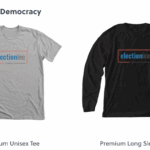 Electionline Merch: You’ve asked for it, well now you’ve got it! Just in time for all of your holiday gift-giving. We’ve opened up an electionline merch store using Bonfire. Currently we’re offering a couple of different t-shirts, a long-sleeve t-shirt and a hoodie.
Electionline Merch: You’ve asked for it, well now you’ve got it! Just in time for all of your holiday gift-giving. We’ve opened up an electionline merch store using Bonfire. Currently we’re offering a couple of different t-shirts, a long-sleeve t-shirt and a hoodie.
Personnel News: Tammy Tobin has joined the Dare County, North Carolina board of elections. The North Carolina State Board of Elections has hired new top staff members. Elections board general counsel Paul Cox has been replaced by Tim Hoegemeyer, a former GOP candidate for state auditor who’s worked in multiple state agencies. Leah Byers will be the agency’s new legislative liaison. The new director of external affairs is Jason Tyson, who had been the spokesman for Republican Insurance Commissioner Mike Causey and also worked for former Gov. Pat McCrory. Jeff Ahlers filed paperwork on Nov. 3 with the Missouri Ethics Commission to run for Cole County Clerk in 2026. Hamtramck City, Michigan Clerk Rana Faraj has been placed on administrative leave. Columbia County, Oregon Clerk Debbie Klug has filed for re-election. Kayla Thompson has been appointed as the new Bennington, Vermont town clerk.
New Research and Resources
 Vote by Mail: Ensuring safe, free, and fair elections is essential to maintaining a functioning democracy, particularly at a moment when three-quarters of Americans believe that democracy is under threat. Mail voting, a widespread feature of our election system, has become politically charged in recent years. Public debate surrounding mail voting has come into greater focus following President Trump’s initial announcement of his intention to issue an executive order (EO) in advance of the 2026 general election. The EO purportedly would attempt to remove certain types of mail voting across the country. Several election law experts have assessed that an EO seeking to change election procedures presents an overreach of executive power and would be unconstitutional. It is unclear ahead of the 2026 general election what types of mail voting a possible Trump EO might attempt to restrict or eliminate. Such an EO could be legally challenged. The president’s stance on mail voting has fluctuated. He has often criticized “100% Mail-In Voting” while at times signaling his support for absentee voting. In this piece, The Brookings Institute examines the important role of mail voting in maintaining a free, safe, and fair electoral process in the United States. They find that mail voting—universal vote-by-mail in particular—has substantial benefits for election administration and tens of millions of U.S. voters. As part of this analysis, they corroborate prior research that mail voting is secure and find low overall mail voting fraud, particularly in universal vote-by-mail voting systems.
Vote by Mail: Ensuring safe, free, and fair elections is essential to maintaining a functioning democracy, particularly at a moment when three-quarters of Americans believe that democracy is under threat. Mail voting, a widespread feature of our election system, has become politically charged in recent years. Public debate surrounding mail voting has come into greater focus following President Trump’s initial announcement of his intention to issue an executive order (EO) in advance of the 2026 general election. The EO purportedly would attempt to remove certain types of mail voting across the country. Several election law experts have assessed that an EO seeking to change election procedures presents an overreach of executive power and would be unconstitutional. It is unclear ahead of the 2026 general election what types of mail voting a possible Trump EO might attempt to restrict or eliminate. Such an EO could be legally challenged. The president’s stance on mail voting has fluctuated. He has often criticized “100% Mail-In Voting” while at times signaling his support for absentee voting. In this piece, The Brookings Institute examines the important role of mail voting in maintaining a free, safe, and fair electoral process in the United States. They find that mail voting—universal vote-by-mail in particular—has substantial benefits for election administration and tens of millions of U.S. voters. As part of this analysis, they corroborate prior research that mail voting is secure and find low overall mail voting fraud, particularly in universal vote-by-mail voting systems.
 Post-Election Debrief Toolkit: After an election cycle, your office likely ends up a long list of ideas for how to improve the next one. Maybe the voter signage caused confusion. Maybe the check-in process slowed things down. Or maybe your office communication could run more smoothly. The insights that come after running an election, and the energy that comes right after an election, are invaluable. But turning them into concrete, achievable goals requires structure, collaboration. Over the past year, the Center for Civic Design has been developing systems to help election officials do just that. Last year, they released the first step in this series: a toolkit to help offices reflect on what worked and what could improve: the Post-election debrief toolkit. Now, they’re excited to share the second part of the series: Setting goals in election operations, a practical guide to help election offices move from reflection to action.
Post-Election Debrief Toolkit: After an election cycle, your office likely ends up a long list of ideas for how to improve the next one. Maybe the voter signage caused confusion. Maybe the check-in process slowed things down. Or maybe your office communication could run more smoothly. The insights that come after running an election, and the energy that comes right after an election, are invaluable. But turning them into concrete, achievable goals requires structure, collaboration. Over the past year, the Center for Civic Design has been developing systems to help election officials do just that. Last year, they released the first step in this series: a toolkit to help offices reflect on what worked and what could improve: the Post-election debrief toolkit. Now, they’re excited to share the second part of the series: Setting goals in election operations, a practical guide to help election offices move from reflection to action.
Ballot Measures, Legislation & Rulemaking
 Alabama: Rep. Adline Clarke (D-Mobile) has filed a bill ahead of the 2026 legislative session that is designed to make voting easier for disabled Alabamians. Clarke said disabled voters are at a disadvantage at the ballot box under current state law. She said House Bill 45 is aimed at bridging that gap. At the bottom of Alabama’s absentee ballot, there is a section that says “only the voter may hand this application to the absentee election manager” or “the voter may also forward this application through the mail.” “That is problematic for a whole lot of people,” said Rep. Clarke. Clarke said people should be able to assist disabled voters without penalty. “People are mailing applications on behalf of disabled persons in good conscience,” she said. “They feel like they should be able to do that, and they should be able to do that, but in the process they should not be breaking the law.” This is the second year Clarke has filed the bill. Alabama’s legislative session for 2026 is scheduled to begin on Jan. 13.
Alabama: Rep. Adline Clarke (D-Mobile) has filed a bill ahead of the 2026 legislative session that is designed to make voting easier for disabled Alabamians. Clarke said disabled voters are at a disadvantage at the ballot box under current state law. She said House Bill 45 is aimed at bridging that gap. At the bottom of Alabama’s absentee ballot, there is a section that says “only the voter may hand this application to the absentee election manager” or “the voter may also forward this application through the mail.” “That is problematic for a whole lot of people,” said Rep. Clarke. Clarke said people should be able to assist disabled voters without penalty. “People are mailing applications on behalf of disabled persons in good conscience,” she said. “They feel like they should be able to do that, and they should be able to do that, but in the process they should not be breaking the law.” This is the second year Clarke has filed the bill. Alabama’s legislative session for 2026 is scheduled to begin on Jan. 13.
Senator Linda Coleman-Madison (D-Birmingham) has reintroduced a bill to streamline the process for restoring an individual’s voting rights following a felony conviction. Senate Bill 24, filed last week, would require the Alabama Board of Pardons and Paroles and secretary of state to post “easily accessible” instructions on their websites detailing the process for certain individuals who have lost their right to vote due to a conviction to restore their voting rights. The bill would also require that the websites include a form for individuals to request a certificate of their eligibility to register to vote, which can be submitted electronically to the Board of Pardons and Paroles. SB24 would mandate that the Board of Pardons and Paroles publicly posts the names of individuals who have had their voting rights restored on its website, alongside information on where they were last registered or their last known residence. The board must also notify the secretary of state of the individuals’ names, addresses and when their right to vote was restored.
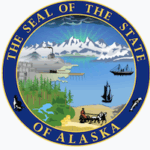 Alaska Ballot Measure: State elections officials have begun reviewing signatures gathered by people opposed to Alaska’s system of open primary elections and ranked-choice general elections to determine whether a repeal ballot measure will appear before voters in 2026. Alaskans enacted the state’s existing elections system via a ballot measure in 2020, and a repeal measure last year failed by only 737 votes out of 320,985 cast. Proponents of the repeal vowed at that time to renew their effort and began gathering signatures in February to force another vote. Based on state law and the number of people who voted in the 2024 statewide election, repeal supporters needed to collect signatures from at least 34,099 registered voters, including a certain minimum number in at least 30 of the 40 state House districts. This week, supporters of the repeal measure said they were submitting more than 48,000 signatures to the Alaska Division of Elections for review. If the repeal petition is deemed to have enough signatures, it would go before voters in either the 2026 primary or the 2026 general election, depending upon the length of next year’s state legislative session. If voters approve the measure in 2026, all three components of the 2020 ballot measure would be repealed.
Alaska Ballot Measure: State elections officials have begun reviewing signatures gathered by people opposed to Alaska’s system of open primary elections and ranked-choice general elections to determine whether a repeal ballot measure will appear before voters in 2026. Alaskans enacted the state’s existing elections system via a ballot measure in 2020, and a repeal measure last year failed by only 737 votes out of 320,985 cast. Proponents of the repeal vowed at that time to renew their effort and began gathering signatures in February to force another vote. Based on state law and the number of people who voted in the 2024 statewide election, repeal supporters needed to collect signatures from at least 34,099 registered voters, including a certain minimum number in at least 30 of the 40 state House districts. This week, supporters of the repeal measure said they were submitting more than 48,000 signatures to the Alaska Division of Elections for review. If the repeal petition is deemed to have enough signatures, it would go before voters in either the 2026 primary or the 2026 general election, depending upon the length of next year’s state legislative session. If voters approve the measure in 2026, all three components of the 2020 ballot measure would be repealed.
 Shasta County, California: Shasta County Board of Supervisors unanimously approved adding an election reform initiative to the ballot for the June 2026 primary. The initiative would make voter ID mandatory, and also require in-person, same day voting. After collecting more than 10,000 signatures in support of the measure in the past few months, the ‘Save Shasta Elections’ organization’s identification reform initiative was deemed ‘sufficient’ by the board of supervisors. The initiative would require each voter to provide identification before their vote is counted, including those who mail-in their ballots. “It did pass, it was sufficient. So, it needs to be put on the ballot” Shasta County Clerk & Registrar of Voters Clint Curtis told the board on November 6. While supervisors unanimously approved putting the initiative on the June 2nd, 2026 ballot, ‘Save Shasta Elections’ leader Laura Hobbs initially pitched a special election in February to vote on the matter. Curtis acknowledged that lawsuits against the county could be filed if the measure is passed by voters. Shasta County Counsel Joseph Larmour also has said in previous meeting that the measure conflicts with the California Constitution, California Elections Code and the National Voter Registration Act.
Shasta County, California: Shasta County Board of Supervisors unanimously approved adding an election reform initiative to the ballot for the June 2026 primary. The initiative would make voter ID mandatory, and also require in-person, same day voting. After collecting more than 10,000 signatures in support of the measure in the past few months, the ‘Save Shasta Elections’ organization’s identification reform initiative was deemed ‘sufficient’ by the board of supervisors. The initiative would require each voter to provide identification before their vote is counted, including those who mail-in their ballots. “It did pass, it was sufficient. So, it needs to be put on the ballot” Shasta County Clerk & Registrar of Voters Clint Curtis told the board on November 6. While supervisors unanimously approved putting the initiative on the June 2nd, 2026 ballot, ‘Save Shasta Elections’ leader Laura Hobbs initially pitched a special election in February to vote on the matter. Curtis acknowledged that lawsuits against the county could be filed if the measure is passed by voters. Shasta County Counsel Joseph Larmour also has said in previous meeting that the measure conflicts with the California Constitution, California Elections Code and the National Voter Registration Act.
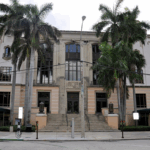 St. Petersburg, Florida: The St. Petersburg City Council will consider an ordinance that would shorten the qualifying period for local candidates and formally align the city’s 2026 election dates with the state’s election calendar. The proposal would establish a one-week qualifying window for municipal candidates, mirroring the period used for state, county and federal elections. The city currently allows a two-week qualifying period beginning 11 weeks before the municipal Primary, along with a separate two-week “pre-qualifying” period. Assistant City Attorney Brett Pettigrew wrote in a memo that the change is intended to give the City Clerk a full week to process candidate paperwork and meet ballot submission deadlines set by the Pinellas County Supervisor of Elections (SOE). If approved, the new schedule would reduce that overall window from three weeks total to two weeks of pre-qualifying followed by a one-week qualifying period. The ordinance also ratifies the dates of St. Petersburg’s 2026 municipal elections, confirming they will be held on the same days as the state Primary and General Elections on Aug. 18, 2026, and Nov. 3, 2026. Voters previously approved a local referendum moving City Council and mayoral elections to even-numbered years, to align with state and federal races. The idea was to encourage greater voter turnout in local elections and reduce election costs by putting races on already existing ballots.
St. Petersburg, Florida: The St. Petersburg City Council will consider an ordinance that would shorten the qualifying period for local candidates and formally align the city’s 2026 election dates with the state’s election calendar. The proposal would establish a one-week qualifying window for municipal candidates, mirroring the period used for state, county and federal elections. The city currently allows a two-week qualifying period beginning 11 weeks before the municipal Primary, along with a separate two-week “pre-qualifying” period. Assistant City Attorney Brett Pettigrew wrote in a memo that the change is intended to give the City Clerk a full week to process candidate paperwork and meet ballot submission deadlines set by the Pinellas County Supervisor of Elections (SOE). If approved, the new schedule would reduce that overall window from three weeks total to two weeks of pre-qualifying followed by a one-week qualifying period. The ordinance also ratifies the dates of St. Petersburg’s 2026 municipal elections, confirming they will be held on the same days as the state Primary and General Elections on Aug. 18, 2026, and Nov. 3, 2026. Voters previously approved a local referendum moving City Council and mayoral elections to even-numbered years, to align with state and federal races. The idea was to encourage greater voter turnout in local elections and reduce election costs by putting races on already existing ballots.
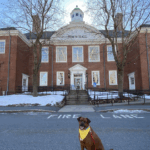 Bedford, Massachusetts: After gaining approval from voters at the Nov. 3 Special Town Meeting, the town will submit a home-rule petition to implement ranked-choice voting in local elections. A home-rule petition is a formal request to the state Legislature for authority to enact a law or regulation that is not already granted by general state law. Ranked-choice voting was added to the STM warrant at the request of residents Madeleine Kando and Ethan Strominger of Bedford Ranked Choice Voting. Following debate, voters authorized the town to submit a home rule petition to the state Legislature by a majority vote. Town Manager Matt Hanson previously said the process of drafting, authorizing, filing, and waiting for approval on a home-rule petition from the state Legislature can take anywhere from six months to a year.
Bedford, Massachusetts: After gaining approval from voters at the Nov. 3 Special Town Meeting, the town will submit a home-rule petition to implement ranked-choice voting in local elections. A home-rule petition is a formal request to the state Legislature for authority to enact a law or regulation that is not already granted by general state law. Ranked-choice voting was added to the STM warrant at the request of residents Madeleine Kando and Ethan Strominger of Bedford Ranked Choice Voting. Following debate, voters authorized the town to submit a home rule petition to the state Legislature by a majority vote. Town Manager Matt Hanson previously said the process of drafting, authorizing, filing, and waiting for approval on a home-rule petition from the state Legislature can take anywhere from six months to a year.
 Ohio: Rep. Ron Ferguson (R-Wintersville) has introduced a bill that would require absentee voters to present a copy of their photo identification when returning their voted ballots. Ferguson said House Bill 577 would make mail-in absentee voting more secure. “In Ohio, it’s already the law that when you vote in person, you need to show that photo ID,” Ferguson said in an interview. “This is just to ensure that we do the same thing for mail-in ballots so that we can be assured that the person who is casting that ballot is indeed the person that is supposed to be casting that ballot.” Ferguson said this change would be easy for voters to comply with: “Most of the mail-in process would be the same. We would just be requiring a copy of a photo ID that you would currently use to vote in person.” But Jen Miller, executive director of the League of Women Voters of Ohio, said there is no need for this bill. “What we need to do now is to make sure that every eligible Ohioan is voting. We have secure elections in Ohio,” Miller said in an interview. Ferguson said his bill requires that organizations that offer mail-in ballot applications to also offer free photocopies of the photo identification for those voters. HB 577 was introduced Nov. 5 – the day after the election – and has been assigned to a committee, but hasn’t had a hearing yet.
Ohio: Rep. Ron Ferguson (R-Wintersville) has introduced a bill that would require absentee voters to present a copy of their photo identification when returning their voted ballots. Ferguson said House Bill 577 would make mail-in absentee voting more secure. “In Ohio, it’s already the law that when you vote in person, you need to show that photo ID,” Ferguson said in an interview. “This is just to ensure that we do the same thing for mail-in ballots so that we can be assured that the person who is casting that ballot is indeed the person that is supposed to be casting that ballot.” Ferguson said this change would be easy for voters to comply with: “Most of the mail-in process would be the same. We would just be requiring a copy of a photo ID that you would currently use to vote in person.” But Jen Miller, executive director of the League of Women Voters of Ohio, said there is no need for this bill. “What we need to do now is to make sure that every eligible Ohioan is voting. We have secure elections in Ohio,” Miller said in an interview. Ferguson said his bill requires that organizations that offer mail-in ballot applications to also offer free photocopies of the photo identification for those voters. HB 577 was introduced Nov. 5 – the day after the election – and has been assigned to a committee, but hasn’t had a hearing yet.
 Wisconsin: Despite past bipartisan backing, a Republican state lawmaker says he has to “punt” an initiative to let election clerks process absentee ballots before election day because it doesn’t have enough GOP support. In September, Republicans and Democrats in the state Assembly stood side-by-side and unveiled a series of bills to update Wisconsin’s election laws. One of those initiatives is known as early processing or Monday processing. Requested by clerks, it would let them process absentee ballots the day before an election so that results can be released sooner once the polls close. The Monday process concept has been unable to clear the Legislature for several years. It was last introduced in 2023. But during a November 6 hearing before the Assembly Committee on Campaigns and Elections, state Rep. Scott Krug, R-Rome, said that while he thinks Monday processing is the “most important reform” lawmakers can do to restore confidence in elections, there aren’t enough Republicans in the state Senate behind it. Krug used a football analogy to make his point. “On the Monday process, it’s 4th and short, there’s 10 minutes left in the game. Right now, I’m going to punt,” Krug said. “There will be time to get the ball back later … if we can get some more input from the state Senate, I think we can figure out a way to get it done.”
Wisconsin: Despite past bipartisan backing, a Republican state lawmaker says he has to “punt” an initiative to let election clerks process absentee ballots before election day because it doesn’t have enough GOP support. In September, Republicans and Democrats in the state Assembly stood side-by-side and unveiled a series of bills to update Wisconsin’s election laws. One of those initiatives is known as early processing or Monday processing. Requested by clerks, it would let them process absentee ballots the day before an election so that results can be released sooner once the polls close. The Monday process concept has been unable to clear the Legislature for several years. It was last introduced in 2023. But during a November 6 hearing before the Assembly Committee on Campaigns and Elections, state Rep. Scott Krug, R-Rome, said that while he thinks Monday processing is the “most important reform” lawmakers can do to restore confidence in elections, there aren’t enough Republicans in the state Senate behind it. Krug used a football analogy to make his point. “On the Monday process, it’s 4th and short, there’s 10 minutes left in the game. Right now, I’m going to punt,” Krug said. “There will be time to get the ball back later … if we can get some more input from the state Senate, I think we can figure out a way to get it done.”
 Wyoming: The Wyoming Legislature’s Joint Corporations, Elections & Political Subdivisions Committee voted this week to sponsor a bill that would prohibit ballot harvesting and make it a felony to knowingly deliver an absentee ballot on behalf of another person, unless the deliverer is an immediate family member or an authorized caregiver. The bill, 26LSO-0042, was advanced by Committee on an 11–2 vote and will be considered during the upcoming 2026 budget session. The legislation broadly prohibits any person from delivering an absentee ballot to a county clerk unless that person is the qualified elector who cast the ballot, an immediate family member of the elector or an authorized employee of a residential care facility. During deliberations, the committee added an exception to include a “bonafide caregiver” for homebound persons. The most debated provision concerns employees of residential care facilities, such as nursing homes. The bill specifies that employees may deliver absentee ballots on behalf of “not more than five qualified electors residing in the facility per election.” For each ballot delivered, the employee must file an affidavit with the county clerk attesting to their authorization. The proposal also increases violations of the delivery prohibition to a felony offense if committed “knowingly and willfully.” If a county clerk or election official becomes aware of an improper delivery, the ballot “shall not be tabulated” and the clerk is required to “attempt to provide notice to the qualified elector that the elector’s ballot has not been tabulated.”
Wyoming: The Wyoming Legislature’s Joint Corporations, Elections & Political Subdivisions Committee voted this week to sponsor a bill that would prohibit ballot harvesting and make it a felony to knowingly deliver an absentee ballot on behalf of another person, unless the deliverer is an immediate family member or an authorized caregiver. The bill, 26LSO-0042, was advanced by Committee on an 11–2 vote and will be considered during the upcoming 2026 budget session. The legislation broadly prohibits any person from delivering an absentee ballot to a county clerk unless that person is the qualified elector who cast the ballot, an immediate family member of the elector or an authorized employee of a residential care facility. During deliberations, the committee added an exception to include a “bonafide caregiver” for homebound persons. The most debated provision concerns employees of residential care facilities, such as nursing homes. The bill specifies that employees may deliver absentee ballots on behalf of “not more than five qualified electors residing in the facility per election.” For each ballot delivered, the employee must file an affidavit with the county clerk attesting to their authorization. The proposal also increases violations of the delivery prohibition to a felony offense if committed “knowingly and willfully.” If a county clerk or election official becomes aware of an improper delivery, the ballot “shall not be tabulated” and the clerk is required to “attempt to provide notice to the qualified elector that the elector’s ballot has not been tabulated.”
Legal Updates This Week
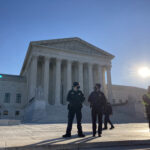 U.S. Supreme Court: The U.S. Supreme Court agreed this week to decide whether a state law can allow Mississippi to count ballots received by election officials within five business days after federal Election Day. The justices decided to take on the case after the Fifth Circuit held that federal laws preempt Mississippi’s law. Under its interpretation of federal Election Day statutes, it found federal “election” day to be, “the day by which ballots must be both cast by voters and received by state officials” and that Mississippi law conflicts with those statutes because it allows ballots to be received after Election Day. In his petition for review, Mississippi Secretary of State Michael Watson asks the justices to overturn this ruling. He argues it not only defies statutory text, but that if left to stand “will have destabilizing nationwide ramifications.” Watson claims that because the votes were cast and ballots were submitted by election day, they can still be counted by the state under federal law. Like all other states, Mississippi requires that ballots for federal offices be cast — marked and submitted to election officials — by that day. And like most other states, Mississippi allows mail-in absentee ballots, mailed by Election Day, to be counted if they are received by election officials soon after. With less than 18 months before the next federal election, Watson argues the appeals court’s ruling will invite nationwide litigation against laws in most states, risking election chaos and confusion. “The stakes are high: Ballots cast by — but received after — Election Day can swing close races and change the course of the country. And this case is an excellent vehicle,” Watson wrote. U.S. Circuit Judge James Graves, a Barack Obama appointee, dissented in an opinion joined by four other judges. He maintained that an election is defined as only ballot casting, not ballot receipt, and that this case raises a question of “exceptional importance.” The justices did not say when they will hear arguments in the case.
U.S. Supreme Court: The U.S. Supreme Court agreed this week to decide whether a state law can allow Mississippi to count ballots received by election officials within five business days after federal Election Day. The justices decided to take on the case after the Fifth Circuit held that federal laws preempt Mississippi’s law. Under its interpretation of federal Election Day statutes, it found federal “election” day to be, “the day by which ballots must be both cast by voters and received by state officials” and that Mississippi law conflicts with those statutes because it allows ballots to be received after Election Day. In his petition for review, Mississippi Secretary of State Michael Watson asks the justices to overturn this ruling. He argues it not only defies statutory text, but that if left to stand “will have destabilizing nationwide ramifications.” Watson claims that because the votes were cast and ballots were submitted by election day, they can still be counted by the state under federal law. Like all other states, Mississippi requires that ballots for federal offices be cast — marked and submitted to election officials — by that day. And like most other states, Mississippi allows mail-in absentee ballots, mailed by Election Day, to be counted if they are received by election officials soon after. With less than 18 months before the next federal election, Watson argues the appeals court’s ruling will invite nationwide litigation against laws in most states, risking election chaos and confusion. “The stakes are high: Ballots cast by — but received after — Election Day can swing close races and change the course of the country. And this case is an excellent vehicle,” Watson wrote. U.S. Circuit Judge James Graves, a Barack Obama appointee, dissented in an opinion joined by four other judges. He maintained that an election is defined as only ballot casting, not ballot receipt, and that this case raises a question of “exceptional importance.” The justices did not say when they will hear arguments in the case.
Also this week, the Supreme Court declined to review the disqualification of an attorney accused of improperly accessing voting machines after the 2020 election as counsel in a defamation case brought by Dominion Voting Systems. Michigan attorney Stefanie Lambert represented Overstock.com founder Patrick Byrne in the defamation suit brought by Dominion, a voting technology company that conspiracists homed in on in the wake of President Trump’s 2020 election loss. She was removed from the case last year after a judge determined she publicly leaked internal records from Dominion in violation of a court order. A lawyer for Byrne contended to the justices that Lambert’s apparent expertise in “election fraud” has made her a threat to Dominion, prompting the company’s bid to disqualify her from representing him in the case, even as she represents him in other litigation.
 Arizona: Maricopa County Superior Court Judge Scott Blaney rejected Maricopa County Recorder Justin Heap’s request to halt an audit of the county’s voter registration system and election technology. Blaney wrote that he was initially concerned voters’ personal information would be at risk, but was “credibly informed” that the county and vendor had a comprehensive nondisclosure agreement and the vendor’s personnel had undergone background checks. Blaney also found “that the Recorder has not established that the Board’s actions with regard to the assessment violate any Arizona statute.” According to Votebeat, the emergency hearing over the audit of the voter registration system was one part of a larger legal fight between Heap and the county Board of Supervisors over how election duties and authority should be divided between them. Heap asked Blaney to issue an immediate order to halt the review of the county’s voter registration system by a vendor, the Intersect Group, and suspend its contract. Heap’s chief information officer, Bryan Colby, in court documents said he was concerned that the vendor would have “unfettered access to sensitive election systems.” Blaney wrote in his ruling that he was particularly concerned about giving the Intersect Group access to voter data typically kept confidential through a separate program for domestic violence victims, police officers, and judges, but he “was credibly informed” in the hearing that the vendor would not have access to that.
Arizona: Maricopa County Superior Court Judge Scott Blaney rejected Maricopa County Recorder Justin Heap’s request to halt an audit of the county’s voter registration system and election technology. Blaney wrote that he was initially concerned voters’ personal information would be at risk, but was “credibly informed” that the county and vendor had a comprehensive nondisclosure agreement and the vendor’s personnel had undergone background checks. Blaney also found “that the Recorder has not established that the Board’s actions with regard to the assessment violate any Arizona statute.” According to Votebeat, the emergency hearing over the audit of the voter registration system was one part of a larger legal fight between Heap and the county Board of Supervisors over how election duties and authority should be divided between them. Heap asked Blaney to issue an immediate order to halt the review of the county’s voter registration system by a vendor, the Intersect Group, and suspend its contract. Heap’s chief information officer, Bryan Colby, in court documents said he was concerned that the vendor would have “unfettered access to sensitive election systems.” Blaney wrote in his ruling that he was particularly concerned about giving the Intersect Group access to voter data typically kept confidential through a separate program for domestic violence victims, police officers, and judges, but he “was credibly informed” in the hearing that the vendor would not have access to that.
 Arkansas: The Arkansas Supreme Court denied Gov. Sarah Huckabee Sanders’ request to stay two lower court orders requiring her to set earlier special election dates for two legislative vacancies Wednesday evening. The court also rejected a request by Attorney General Tim Griffin’s office to consolidate the two cases. The identical orders, which did not explain the justices’ reasoning, granted the state’s motions for expedited consideration of its appeals of the orders handed down by two Pulaski County Circuit judges last month. Associate Justice Rhonda Wood would have granted the request for a faster briefing schedule, according to the order. Associate Justice Barbara Webb did not participate. “I am disappointed by the rulings and will continue to vigorously defend the Governor and Secretary of State,” Attorney General Tim Griffin said via a spokesperson. Griffin’s office is representing Sanders and Secretary of State Cole Jester in both lawsuits. Sanders set special elections for the Senate District 26 and House District 70 seats earlier this year. However, her decision to set the special elections for June 2026 — after the Legislature’s fiscal session in April — immediately generated bipartisan criticism and lawsuits from SD 26 and HD 70 voters, as well as the Democratic Party of Arkansas, who said it would deprive them of representation for important legislative deliberations on issues like education and prison funding. Under Arkansas law, the governor is required to schedule a special election date to fill a vacancy within 150 days unless she found it was “impracticable or unduly burdensome” to do so. Further, if the election couldn’t be held within 150 days, it had to be held on the earliest practicable date after that statutory deadline.
Arkansas: The Arkansas Supreme Court denied Gov. Sarah Huckabee Sanders’ request to stay two lower court orders requiring her to set earlier special election dates for two legislative vacancies Wednesday evening. The court also rejected a request by Attorney General Tim Griffin’s office to consolidate the two cases. The identical orders, which did not explain the justices’ reasoning, granted the state’s motions for expedited consideration of its appeals of the orders handed down by two Pulaski County Circuit judges last month. Associate Justice Rhonda Wood would have granted the request for a faster briefing schedule, according to the order. Associate Justice Barbara Webb did not participate. “I am disappointed by the rulings and will continue to vigorously defend the Governor and Secretary of State,” Attorney General Tim Griffin said via a spokesperson. Griffin’s office is representing Sanders and Secretary of State Cole Jester in both lawsuits. Sanders set special elections for the Senate District 26 and House District 70 seats earlier this year. However, her decision to set the special elections for June 2026 — after the Legislature’s fiscal session in April — immediately generated bipartisan criticism and lawsuits from SD 26 and HD 70 voters, as well as the Democratic Party of Arkansas, who said it would deprive them of representation for important legislative deliberations on issues like education and prison funding. Under Arkansas law, the governor is required to schedule a special election date to fill a vacancy within 150 days unless she found it was “impracticable or unduly burdensome” to do so. Further, if the election couldn’t be held within 150 days, it had to be held on the earliest practicable date after that statutory deadline.
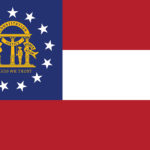 Georgia: The State Election Board voted to approve a settlement agreement in a lawsuit brought by American Oversight which alleged the board obstructed access to public records. In a lawsuit filed last year in Fulton County, American Oversight claimed the board had “systematically obstructed public records requests” for information about voter eligibility challenges, communications with outside organizations and voter citizenship verification. All the board members had used private Gmail accounts to conduct official business but have since switched over to official government emails. The settlement agreement obtained by The Atlanta Journal-Constitution said the board will instruct all staff to conduct business and communication on their official email accounts and not through personal email accounts, texts or other messaging platforms. It also said board members must forward official business communications received through personal messaging channels to their official government emails. Once the settlement is finalized, the board is required to pay $50,000 in state funds to American Oversight for attorneys’ fees, according to the agreement. American Oversight Executive Director Chioma Chukwu said in a statement: “Today’s settlement makes clear that election officials are not above the law — they must comply with state transparency requirements, and if they don’t, they will be held accountable.”
Georgia: The State Election Board voted to approve a settlement agreement in a lawsuit brought by American Oversight which alleged the board obstructed access to public records. In a lawsuit filed last year in Fulton County, American Oversight claimed the board had “systematically obstructed public records requests” for information about voter eligibility challenges, communications with outside organizations and voter citizenship verification. All the board members had used private Gmail accounts to conduct official business but have since switched over to official government emails. The settlement agreement obtained by The Atlanta Journal-Constitution said the board will instruct all staff to conduct business and communication on their official email accounts and not through personal email accounts, texts or other messaging platforms. It also said board members must forward official business communications received through personal messaging channels to their official government emails. Once the settlement is finalized, the board is required to pay $50,000 in state funds to American Oversight for attorneys’ fees, according to the agreement. American Oversight Executive Director Chioma Chukwu said in a statement: “Today’s settlement makes clear that election officials are not above the law — they must comply with state transparency requirements, and if they don’t, they will be held accountable.”
 Mississippi: The U.S. Supreme Court will decide whether Mississippi can uphold a COVID-era state law that allowed for ballots to be received and counted up to five days after an election. A decision from the high court is expected to have broad implications as Mississippi is among over a dozen states with similar laws. Justices agreed to hear the Mississippi case after the Fifth Circuit Court of Appeals declined to rehear a previous ruling from a three-judge panel, maintaining the panel’s decision that Mississippi cannot count ballots that arrive after Election Day. The court sided with the plaintiffs – Republican National Committee, the Mississippi Republican Party, the Mississippi Libertarian Party and two private individuals – in affirming the prior decision, with ten judges voting to deny a rehearing and five voting in favor. Attorneys for the state representing Secretary of State Michael Watson (R) and local election officials then asked the U.S. Supreme Court to overturn the lower court ruling and allow the state law to remain in place. The matter began after the plaintiffs sued Harrison County election officials, along with Secretary Watson, in their official capacities, seeking an injunction against the 2020 mail-in ballot law based on the Election Law Clause of the U.S. Constitution. That clause gives Congress the authority to set the time for choosing the election of the president, senators, and members of the U.S. House of Representatives. U.S. District Judge Louis Guirola Jr. initially dismissed the lawsuit, writing that the Mississippi law “is consistent with federal law and does not conflict with the Elections Clause, the Electors’ Clause, or the election-day statutes.” However, the three-judge panel at the Fifth Circuit overturned Judge Guirola’s ruling, noting that while states are empowered by Congress to conduct federal elections, federal laws preempt state regulation of elections.
Mississippi: The U.S. Supreme Court will decide whether Mississippi can uphold a COVID-era state law that allowed for ballots to be received and counted up to five days after an election. A decision from the high court is expected to have broad implications as Mississippi is among over a dozen states with similar laws. Justices agreed to hear the Mississippi case after the Fifth Circuit Court of Appeals declined to rehear a previous ruling from a three-judge panel, maintaining the panel’s decision that Mississippi cannot count ballots that arrive after Election Day. The court sided with the plaintiffs – Republican National Committee, the Mississippi Republican Party, the Mississippi Libertarian Party and two private individuals – in affirming the prior decision, with ten judges voting to deny a rehearing and five voting in favor. Attorneys for the state representing Secretary of State Michael Watson (R) and local election officials then asked the U.S. Supreme Court to overturn the lower court ruling and allow the state law to remain in place. The matter began after the plaintiffs sued Harrison County election officials, along with Secretary Watson, in their official capacities, seeking an injunction against the 2020 mail-in ballot law based on the Election Law Clause of the U.S. Constitution. That clause gives Congress the authority to set the time for choosing the election of the president, senators, and members of the U.S. House of Representatives. U.S. District Judge Louis Guirola Jr. initially dismissed the lawsuit, writing that the Mississippi law “is consistent with federal law and does not conflict with the Elections Clause, the Electors’ Clause, or the election-day statutes.” However, the three-judge panel at the Fifth Circuit overturned Judge Guirola’s ruling, noting that while states are empowered by Congress to conduct federal elections, federal laws preempt state regulation of elections.
 Texas: Jolt Initiative, a nonprofit that aims to increase civic participation among Latinos, is suing Texas Attorney General Ken Paxton to block his efforts to shut them down. Paxton announced that he was seeking to revoke the nonprofit’s charter, alleging that the group had orchestrated “a systematic, unlawful voter registration scheme.” In the suit, Jolt’s lawyers argue Paxton’s efforts to shut them down are retaliation. The attorney general’s office has also in recent years targeted other organizations aiding Latinos and migrants, such as the effort to investigate and shut down El Paso-based Annunciation House. “Jolt is simply the latest target of his unlawful campaign to undermine and silence civil rights groups in Texas,” said Mimi Marziani, a lawyer representing the nonprofit. Last year, the organization successfully sued to stop the state’s investigation into their voter registration efforts.
Texas: Jolt Initiative, a nonprofit that aims to increase civic participation among Latinos, is suing Texas Attorney General Ken Paxton to block his efforts to shut them down. Paxton announced that he was seeking to revoke the nonprofit’s charter, alleging that the group had orchestrated “a systematic, unlawful voter registration scheme.” In the suit, Jolt’s lawyers argue Paxton’s efforts to shut them down are retaliation. The attorney general’s office has also in recent years targeted other organizations aiding Latinos and migrants, such as the effort to investigate and shut down El Paso-based Annunciation House. “Jolt is simply the latest target of his unlawful campaign to undermine and silence civil rights groups in Texas,” said Mimi Marziani, a lawyer representing the nonprofit. Last year, the organization successfully sued to stop the state’s investigation into their voter registration efforts.
Smith County Judge Taylor Heaton has determined to overturn the election for the City of Hawkins Alderman Seat 5, leaving the seat to be vacant until 2026. Two contestants, Norma Oglesby and Jacque Burns both ran for the position. Following the May 3 election, Burns was first declared to be the winner, having 77 total votes over Oglesby’s total of 65. Heaton found that evidence shown in court revealed “significant discrepancies” between the number of votes counted and the number of votes with valid signatures, according to documents obtained by KLTV. The document states Heaton agreed with evidence Oglesby submitted arguing election workers “forgot to get people to sign the list,” so, on the list of 146 ballots for election day, all it had was the highlighted names of the people, without their signatures. Of the 91 total votes on election day, Heaton deemed only one to be legal. Of the 55 total votes cast during early voting, only 41 were found to be legal. This leaves a total 104 invalid votes and only 42 legal votes. Taking into consideration the invalid votes, Heaton found the margin of victory to be too small to declare a true winner, saying the error “constitutes irreparable harm to the integrity of the election process.” Heaton determined to overturn the position’s election and declared the seat to be vacant until 2026.
 Utah: Judge Dianna Gibson of Utah’s 3rd District Court ruled this week that a map drawn by state lawmakers and submitted by the Utah Legislature unfairly favored Republicans. Gibson made the late-night ruling and selected a map, referred to as “Map 1,” brought by plaintiffs in the case: the League of Women Voters of Utah and Mormon Women for Ethical Government. The ruling narrowly upheld the Nov. 10 deadline to select a new map in the state ahead of the 2026 midterm election. The map drawn by lawmakers, referred to as “Map C,” was submitted to the court in September after Gibson initially ordered the existing map be redrawn to better align with the state’s redistricting law, Proposition 4. Map 1 was drawn to include nearly the whole of Salt Lake County, while Map C splits the state’s only Democratic county into different districts. In October, Map C was contested in court after a series of statistical tests were performed. A witness called by plaintiffs suggested that, based on the data collected, Map C was “more heavily Republican than almost all of the computer-simulated plans.” Lt. Gov. Deidre Henderson stated that she would comply with Gibson’s ruling and immediately implement Map 1 “unless otherwise ordered by an appeals court.” Later on Tuesday morning, Henderson said there “will likely be an emergency appeal,” but defended her move to waste no time in making the change.
Utah: Judge Dianna Gibson of Utah’s 3rd District Court ruled this week that a map drawn by state lawmakers and submitted by the Utah Legislature unfairly favored Republicans. Gibson made the late-night ruling and selected a map, referred to as “Map 1,” brought by plaintiffs in the case: the League of Women Voters of Utah and Mormon Women for Ethical Government. The ruling narrowly upheld the Nov. 10 deadline to select a new map in the state ahead of the 2026 midterm election. The map drawn by lawmakers, referred to as “Map C,” was submitted to the court in September after Gibson initially ordered the existing map be redrawn to better align with the state’s redistricting law, Proposition 4. Map 1 was drawn to include nearly the whole of Salt Lake County, while Map C splits the state’s only Democratic county into different districts. In October, Map C was contested in court after a series of statistical tests were performed. A witness called by plaintiffs suggested that, based on the data collected, Map C was “more heavily Republican than almost all of the computer-simulated plans.” Lt. Gov. Deidre Henderson stated that she would comply with Gibson’s ruling and immediately implement Map 1 “unless otherwise ordered by an appeals court.” Later on Tuesday morning, Henderson said there “will likely be an emergency appeal,” but defended her move to waste no time in making the change.
 Wyoming: Laramie County District Court Judge Nathaniel S. Hibben ruled late last week that Wyoming’s closed primary election system and its so-called “sore loser” laws do not violate the state’s constitution. “The challenged statutes regulate the manner in which political rights are exercised but do not abridge the rights themselves,” Hibben wrote in his decision. “The court likewise finds the challenged statutes do not deny Plaintiffs equal protection of the laws.” First filed in August 2024, the lawsuit initially sought to overturn the state’s prohibition on failed primary candidates appearing on the general election ballot as independents, known as a “sore loser law. In April, the complaint expanded to challenge Wyoming’s closed primary election system as well as its crossover voting ban, which limits how and when voters may affiliate with a political party. The plaintiffs, who included voters, former political candidates and a retired state lawmaker, argued that such laws violate the Wyoming Constitution’s guarantee of “political equality” and “impermissibly discriminate against candidates and voters not affiliated with a major political party.” Those laws, however, are a “valid exercise of legislative power,” Hibben ruled, adding that his decision is likely not the last in the case. “As the parties made clear at argument on these motions, this dispute will inevitably be resolved by the Wyoming Supreme Court,” the ruling states.
Wyoming: Laramie County District Court Judge Nathaniel S. Hibben ruled late last week that Wyoming’s closed primary election system and its so-called “sore loser” laws do not violate the state’s constitution. “The challenged statutes regulate the manner in which political rights are exercised but do not abridge the rights themselves,” Hibben wrote in his decision. “The court likewise finds the challenged statutes do not deny Plaintiffs equal protection of the laws.” First filed in August 2024, the lawsuit initially sought to overturn the state’s prohibition on failed primary candidates appearing on the general election ballot as independents, known as a “sore loser law. In April, the complaint expanded to challenge Wyoming’s closed primary election system as well as its crossover voting ban, which limits how and when voters may affiliate with a political party. The plaintiffs, who included voters, former political candidates and a retired state lawmaker, argued that such laws violate the Wyoming Constitution’s guarantee of “political equality” and “impermissibly discriminate against candidates and voters not affiliated with a major political party.” Those laws, however, are a “valid exercise of legislative power,” Hibben ruled, adding that his decision is likely not the last in the case. “As the parties made clear at argument on these motions, this dispute will inevitably be resolved by the Wyoming Supreme Court,” the ruling states.
According to WyoFile, the Natrona County District Attorney’s Office has charged Weston County Clerk Becky Hadlock for failing to appear at a legislative committee meeting in Casper after she was subpoenaed by state lawmakers, court filings show. The subpoena, issued by Rep. Chris Knapp, R-Gillette, in his capacity as co-chair of the Joint Management Audit Committee, required Hadlock to appear at a September hearing, where lawmakers were expected to question her about her office’s actions in the November 2024 election. Hadlock, however, did not attend the meeting, prompting lawmakers to pursue criminal charges. The violation is a misdemeanor, according to state law. If convicted, Hadlock could face up to six months in jail and a $100 fine. A hearing in the case is set for Nov. 14 in Natrona County Circuit Court in Casper, according to a criminal summons.
Opinions This Week
National Opinions: Election Day 2025 | Midterms | Voting Rights Act | Voting rights | SCOTUS | Election security
Alaska: Citizenship
California; Voter ID
Colorado: Tina Peters
Connecticut: Early voting
Georgia: Voting system | Election code
Hawai’i: Primaries | Vote by mail
Louisiana: Voting rights
Maine: Ballot measure
New Mexico: Ranked choice voting
North Carolina: “Off year” elections
Ohio: Vote by mail | Democracy
Oregon: Primaries
Pennsylvania: Voter confidence
Texas: Turnout
Utah: Trust in elections
Wyoming: Election legislation
Upcoming Events
The Supreme Court, the Voting Rights Act, and the 2026 Elections: The Safeguarding Democracy Project at UCLA Law promotes research, collaboration, and advocacy aimed at ensuring continued free and fair elections in the United States. This webinar will be moderated by Rick Hasen and feature: Ellen Katz, University of Michigan, Lenny Powell, Native American Rights Fund (NARF), and Deuel Ross, Legal Defense Fund. When: November 18, 3:15pm Eastern. Where: Online.
The Fragile Republic: Lessons on Political Violence from the Founding to Today: As America approaches its 250th anniversary, political violence once again tests the strength of our democratic institutions and civic culture. What can we learn from the early republic’s own battles with factionalism and unrest, and how can those lessons guide us today? Join the R Street Institute for a thought-provoking conversation with an exceptional panel of historians, journalists, and policy leaders. Together, they will explore how the founders confronted political violence, how those challenges echo in today’s polarized environment, and what practical steps can help strengthen democratic norms and protect civic life for the next 250 years. Featuring: [Moderator] Sabrina Schaeffer, Vice President, Public Affairs, R Street Institute, [Moderator] Lisel Petis, Policy Director, Criminal Justice and Civil Liberties, R Street Institute, Greg Lukianoff, President and CEO, Foundation for Individual Rights and Expression, Peter Savodnik, Senior Editor, The Free Press, Noah Rothman, Senior Writer, National Review, and Joanne B. Freeman, Professor of History and American Studies, Yale University When: November 19, 3pm Eastern. Where: Online.
2025 New England Association of City and Town Clerks Conference: When: November 19-21. Where: Bangor, Maine.
Lessons Learned from 2025 Elections and the Path to 2026: Please join the Center for Election Innovation & Research for a webinar, “Lessons Learned from 2025 Elections and the Path to 2026.” In the webinar, CEIR Executive Director David Becker will discuss the 2025 elections, the federal government’s election-related actions, and the implications for the 2026 midterms. The discussion will cover President Trump’s March executive order on elections, the Justice Department’s lawsuits seeking access to states’ sensitive voter data, and voting trends in the off-year election cycle. David will analyze the current state of our election system and explore how voters can best prepare for the crucial midterm elections next year. When: November 24, 2:30pm Eastern. Where: Online
2025 Michigan Association of County Clerks (MACC) Fall Quarterly Meeting: When: December 1-2. Where: Traverse City.
2025 Alaska Association of Municipal Clerks Annual Meeting: When: December 7-10. Where: Anchorage.
Alabama Association of Municipal Clerks & Administrators Fall Conference: When: December 9-12. Where: Online & Tuscaloosa.
JEOLC 2026: The Election Center will host the 2026 JEOLC conference at the Ritz Carlton in Pentagon City, Virginia from January 6-10. One CERA renewal class will be offered. Please visit the Election Center website for more information and to register when it’s available.
iGO Midwinter Conference: The International Association of Government Officials will hold its Midwinter Conference in Albuquerque, New Mexico from January 19-23, 2026. Please visit the iGO website for more information and to register.
2026 NASS Winter Conference: The National Association of Secretaries of State will hold its 2026 Winter Conference in Washington, DC from January 28-31. Please refer to the NASS website for more information about the event and to register.
2026 NASED Winter Conference: Twice a year, National Association of State Election Directors members gather to discuss the latest developments in election administration. Members of the public are welcome to attend at the non-member registration rate. Please refer to the NASED website for information about the 2026 Winter Conference. When: Feb. 1-3, 2026. Where: Washington, DC.
2026 NACo Legislative Conference: The National Association of Counties will hold its 2026 Legislative Conference in Washington, DC from February 21-24, 2026. Please visit the NACo website for more information about the event and to register.
Election Center February Workshop: Focusing on interaction and sharing of practices selected by members to receive People’s Choice Awards, the February Workshops formalize those critical conversations that happen at conferences during meals, in the hallways, & the hotel lobby. The agenda augments the award-winning member presentations with applicable research and resources.Two CERA core courses and one renewal will be held following the workshop. When: February 25-27. Where: Jacksonville, Florida.
Job Postings This Week
electionlineWeekly publishes election administration job postings each week as a free service to our readers. To have your job listed in the newsletter, please send a copy of the job description, including a web link to mmoretti@electionline.org. Job postings must be received by 5pm on Wednesday in order to appear in the Thursday newsletter. Listings will run for three weeks or till the deadline listed in the posting.
Accounting & Payroll Specialist, King County, Washington– We are seeking a detail-oriented and collaborative professional to support payroll, finance, and human resources operations. The Accounting & Payroll Specialist supports the department’s mission by processing payroll and vendor payments, maintaining accurate financial and employee records, supporting audits and reporting, and contributing to continuous improvement initiatives. Work is performed under limited supervision and requires independent judgment. This position reports directly to the Administrative Services Manager and works closely with both the Finance Administrator I and the Human Resource Analyst. The ideal candidate thrives in a fast-paced environment, values accuracy and confidentiality, and enjoys delivering exceptional customer service to employees and partners throughout the organization. Salary: $30.50 – $38.80 Hourly. Deadline: December 1. Application: For the complete job listing and to apply, click here.
Election Administrator, Victoria County, Texas–Performs vital work planning, organizing, coordinating, and managing federal, state, and local elections plus all facets of voter registration processes in accordance with the Texas Election Code, and other applicable federal, state, or local laws and regulations, including administrative direction from the Texas Secretary of State. Ensuring smooth elections operations including inputting and maintaining voter registration databases, training and supervising poll works, preparing staffing and logistics for voting, administering early voting by mail and in-person, supervising balloting & tabulation, and preparing final canvassing reports. Coordinating closely with political party chairs in conducting primary, runoff, and general elections while guaranteeing impartiality. Preserving voter registration applications, official election documents, and candidate campaign filings/disclosures. Salary: $61,494 – $76,868. Application: For the complete job listing and to apply, click here.
Elections Director, Utah County, Utah– Under general direction of the County Clerk, plans, directs, and administers all federal, state, and local elections held within the county. Ensures strict compliance with all governing election laws and manages the elections functions including voter registration databases, electronic voting systems, candidate services, and the full elections process for Utah County. Salary: $97,136 – $111,716. Deadline: December 3. Application: For the complete job listing and to apply, click here.
Elections Manager, Kalamazoo County, Michigan–The purpose of this job is to manage and supervise all election operations within Kalamazoo County under the direction of the County Clerk and Chief Deputy Clerk. The Elections Manager ensures compliance with federal, state, and local election laws while coordinating with various jurisdictions to conduct fair, accurate, and transparent elections. This position is responsible for leading all phases of election planning, execution, and post-election auditing, supervising division staff, and serving as a liaison to election-related boards, commissions, local clerks, and the State of Michigan. Salary: $81,744- $95,638. Application: For the complete job listing and to apply, click here.
Deputy Director, Surrey County, North Carolina– The County of Surry is accepting applications for the full-time position of Deputy Director of Elections. This position assists the Elections Director with managing the daily operations of the Board of Elections office and with the preparation and conduct of elections in accordance with federal, state, and local laws. The Deputy Director also serves as Acting Director in the Director’s absence. Key responsibilities include planning, preparing, and conducting all elections; supporting candidate filing, ballot preparation, absentee and early voting, and election-day logistics; overseeing the testing, maintenance, and certification of voting equipment; assisting with reconciliation and post-election reporting; maintaining the voter registration database and conducting list maintenance; supervising and training precinct officials; coordinating polling places and election supplies; preparing training materials and forms; and ensuring compliance with election laws and security protocols. The position also requires excellent customer service to voters, candidates, political parties, and the public, along with representing the department at trainings and community events. Other duties may be assigned as needed. Salary: $41,508 – $69,124. Application For the complete job listing and to apply, click here.
Election Operations & Workforce Manager, Charleston County, South Carolina– The Board of Voter Registration and Elections is an award-winning organization dedicated to excellence in electoral processes. Our mission is to daily serve the Charleston County voting constituency with Vigilance, Objectivity, and Transparency in a manner that promotes due diligence Excellence in all aspects of Elections Management. We are committed to continuous improvement, innovative practices, and exceptional service to our community, ensuring every voter’s voice is heard. Are you driven by a passion for democracy and civic engagement? Join the Board of Voter Registration and Elections as the Election Operations and Workforce Manager and play a critical role in delivering seamless, fair, and accessible elections. Key Responsibilities: Poll Worker Recruitment and Management; Polling Location Management; Liaison and Community Engagement; Support for Election Operations on Election Day and Early Voting; and Team Leadership. Salary: $68,140 – $89,252. Application: For the complete job listing and to apply, click here.
Elections Analyst, City of Portland, Oregon– The City Auditor’s Office is seeking a mission-driven, versatile Elections Analyst to add capacity in critical areas of regulatory enforcement and ballot qualification. This position works within the Elections Division and will advance standards and procedures for the regulated community while providing timely information to the public. The Elections Analyst works within a team of five employees and reports to the City Elections Officer. The Elections Division serves Portlanders by providing elections cycle management, voter education campaigns, and oversight of campaign finance and lobbying regulations. We’re looking for someone that can provide fast-paced yet detailed program administration and analysis, plan for and conduct investigations, assist with communications, and provide general and technical customer service to a wide range of elections customers. The Elections Analyst works most closely on lobbying regulations and campaign finance enforcement while playing an important role in candidate and petition qualification. All staff have opportunities to learn and grow within the Division with cross-training and access to regular trainings and professional development throughout the year. Staff in the Elections Division are likely to have heavier workloads during and leading up to an election. The Auditor is an elected position, independent of City Council and accountable only to the public. The Auditor’s Office ensures open and accountable government by providing impartial reviews and investigations, access to public information, and services to City government and the public. It employs over 50 people across six divisions. Deadline: November 24. Application: For the complete job listing and to apply, click here.
Legislative Director, Finance, Pensions & Intergovernmental Affairs (FPIGA), NACo – We are seeking a highly motivated individual to serve as the Legislative Director for Finance, Pensions and Intergovernmental Affairs (FPIGA). This position also serves as NACo’s liaison to the Local Government Legal Center (LGLC). This position is responsible for developing and executing advocacy strategies, analyzing legislation and regulations, and engaging with federal officials and member counties on a portfolio including tax, finance, municipal bonds, public pensions, intergovernmental relations, and local governance legal issues. The Legislative Director will ensure counties have a strong voice in key federal fiscal and intergovernmental decisions and lead NACo’s engagement in legal advocacy through the LGLC. Salary: $100,000-$110,000. Application: For the complete job listing and to apply, click here.
Organizer, Minnesota– We are looking for a creative and collaborative Organizer to join the Common Cause team in Minnesota. This is a key role supporting our organizing and outreach programs and promoting civic engagement across the state. This is a full-time role reporting to the Executive Director, Minnesota and is based in Minnesota, with a preference for candidates located in Olmsted County or St. Cloud, with an expectation to travel around Minnesota at least 2 days per week, with a maximum of 5 days a calendar week during the legislative session, and peak summer engagement season. This is a termed position, starting on November 1, 2025 and ending October 31, 2027. Salary: $63,860 – $80,340 a year. Application: For the complete job listing and to apply, click here.
Remote Sales Director, SOE Software– SOE Software is seeking a driven Sales Director to expand our modernization and transparency solutions for state and local governments. In this full-cycle sales role, you’ll own the process from lead generation through contract signing. You’ll represent SOE at conferences and events, confidently starting conversations and building lasting relationships with government officials. By connecting our technology to outcomes like transparency, accessibility, and public trust, you’ll help election offices and public agencies better serve their communities. Application: For the complete job listing and to apply, click here.
Training Program Manager, Charleston County, South Carolina– Democracy works best when every election runs flawlessly—and that starts with exceptional training. As Training Manager for the Board of Voter Registration and Elections, you’ll empower our poll managers and staff to deliver elections that are fair, accessible, and trusted by every voter in Charleston County. The Board of Voter Registration and Elections is an award-winning organization dedicated to excellence in electoral processes. Our mission is to daily serve the Charleston County voting constituency with Vigilance, Objectivity, and Transparency in a manner that promotes due diligence Excellence in all aspects of Elections Management. We believe that people are the foundation of successful elections. That’s why training is not just a task—it’s a core function of our mission. When our teams are prepared, voters can be confident that their voice will be heard, and their ballot counted. As Training Manager, you are not simply teaching procedures—you are building trust in the democratic process. You will design and deliver training that helps every poll manager, staff member, and Board member understand the importance of their role, perform it with confidence, and meet the highest standards of service to our voters. Salary: $68,140.00 – $82,000.00 Annually. Application: For the complete job listing and to apply, click here.
Voter Outreach and Election Official Recruiting Coordinator, Buncombe County, North Carolina– Buncombe County NC is hiring an Elections Coordinator: Voter Outreach and Election Official Recruiting. Join our team headquartered in Asheville, NC surrounded by the Blue Ridge Mountains! This person will manage recruitment and voter outreach and also supports our Training Coordinator in planning and delivering trainings effectively. Ideal candidates work compassionately with technologically challenged community members, are able to build trust with all political parties, are highly organized, and are also comfortable with public speaking, phone calls and training adults of all ages. Elections experience is preferred. Salary: $29.51 – $34.96 per hour dependent on relevant experience. Deadline: November 30. Application: For the complete job listing and to apply, click here.
Marketplace
electionline provides no guarantees as to the quality of the items being sold and the accuracy of the information provided about the sale items in the Marketplace. Ads are provided directly by sellers and are not verified by electionline. If you have an ad for Marketplace, please email it to: mmoretti@electionline.org